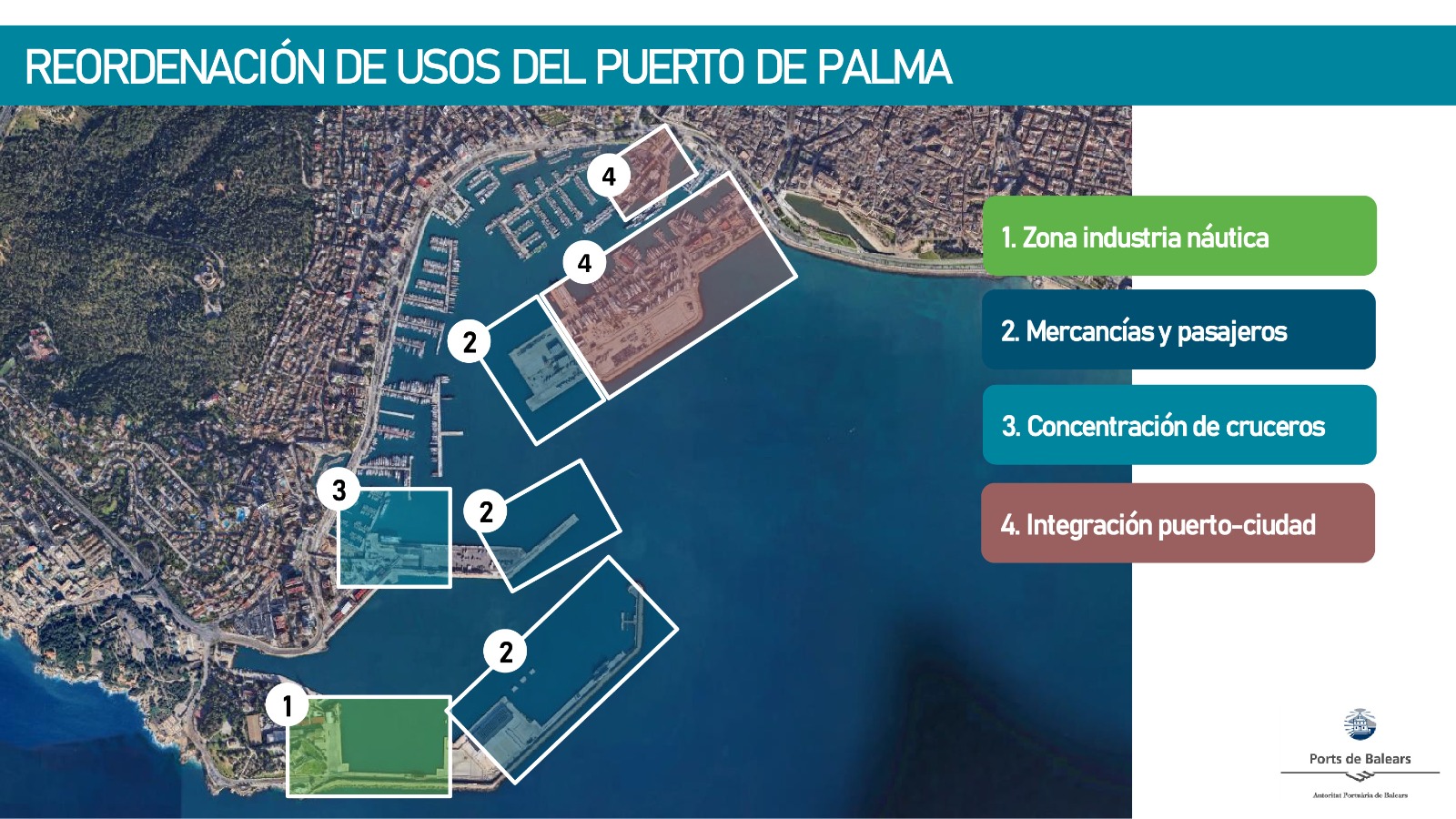
The Port Authority of the Balearic Islands initiates the reorganisation of the port of Palma
The Board of Directors has agreed to get formalities underway for the project to reorganise the port's uses and infrastructures, having first consulted and reached a consensus with stakeholders
Palma
30/10/2024- Environment and CSR
- Port-city
- Transport and infrastructure
- Socio-economic development
Today, the Board of Directors of the Port Authority of the Balearic Islands (APB) met in Palma and agreed to initiate the studies and plans for a new project aimed at reconfiguring the infrastructure and uses of the port of Palma, following a participatory process with stakeholders.
The solution will have to take into account the four key areas established and agreed upon by all the stakeholders consulted over the past few months. Firstly, it must maintain the current simultaneity of the port operations on the commercial docks, the Ponent-Paraires docks and the West dock to reduce the risk of operational congestion in terms of loading and unloading goods and passengers, particularly at peak times in the morning.
Secondly, it will relocate the space allocated for cruise operations to the Ponent-Paraires dock. In parallel, and to the extent compatible with the continuation of port operations in each area, the proposal will also provide for the phased relocation of the repair and maintenance areas to the West dock and within the sheltered waters of the port.
Finally, and as an added benefit to the overall merit of the proposal, the new configuration envisages a project to improve the integration between the city and the port, using the spaces freed up by relocating the nautical repair industries that currently occupy the area in front of the Cathedral and the Contramoll-Mollet area, both of which will be earmarked for initiatives relating to culture, training and, in particular, sport, prioritising the need to increase the quantity and quality of spaces given over to public use.
At the same meeting, the Board of Directors agreed to initiate the appropriate procedures, including the tenders needed to further define the measures to be undertaken and estimate the amount of public and private investment required. It also gave the green light for plans for the new infrastructures resulting from the reorganisation of the port to be drawn up based on the requisite economic and environmental studies.
Broad consensus
Last summer, the APB began a series of meetings with representatives of its stakeholders to comply with the requirements set out by its Board of Directors and State Ports, which stipulated that it would support any port development solution fully aligned with the economic, environmental and social sustainability of Palma and the island of Mallorca, and which emanated from a broad consensus between all the political, institutional, economic and social stakeholders within the sheltered waters of the existing port.
As a result, between June and October 2024, the port authority conducted a participatory process in which the main themes of the proposal to reorganise the operations in the port of Palma were presented to more than 65 representatives of various collectives.
Thus, meetings were held with the nautical sector through associations and concessionaire companies such as APEAM, STP- Servicios Técnicos Portuarios, Astilleros de Mallorca, Balearic Marine Cluster, ADNEA, FANMED, Club de Mar, Naviera Balear, Pantalán del Mediterráneo, Marina Puerto de Mallorca, Marina Cuarentena, La Llotja Marina Charter, the Association of Balearic Nautical Clubs, AENIB and ANADE.
In the financial sector, meetings were held with PIMEM, PIMECO, CAEB, the Chamber of Commerce, AFEDECO, and ACOIPAM. While in the social and environmental sphere, the APB met with the Association of Friends of the Maritime Museum, the Ran de Mar Association, the Palma Neighbourhood Association, the Royal Spanish Naval League, the Alzinaires Association, the Palma Fishermen's Guild, the Federation of Fishermen's Guilds of the Balearic Islands, the Passeig Marítim Neighbourhood Association, the Civil Society Forum and ARCA.
On behalf of professional associations, meetings were held with the Professional College of Architects, the College of Naval Engineers and the College of Civil Engineers.
Lastly, the series of meetings concluded with talks in the political sphere, meeting with several parliamentary groups, including the Partit Popular, PSIB-PSOE, Unides Podem/MÉS per Mallorca, VOX, and the Government's Delegate in the Balearic Islands, Alfonso Rodríguez.
A change of course
The Board of Directors of the APB unanimously agreed, at a meeting held on 5 June this year, to abandon all environmental procedures related to the 2020 approved plan, which envisaged the concentration of regular traffic in the West dock and the use of the commercial docks for the nautical maintenance industry, and to suspend the contract for drafting the construction projects.
The decision was taken after it became clear that some stakeholders, such as the shipping companies and the maintenance industry, disagreed with the substance of the 2020 plan because it failed to address long-term needs.
After the APB's Board of Directors decided to halt the implementation of the plan, the president of the APB, Javier Sanz, promised to put forward a new proposal for the configuration of the port of Palma in the coming months, a commitment he fulfilled today and which received unanimous approval.







